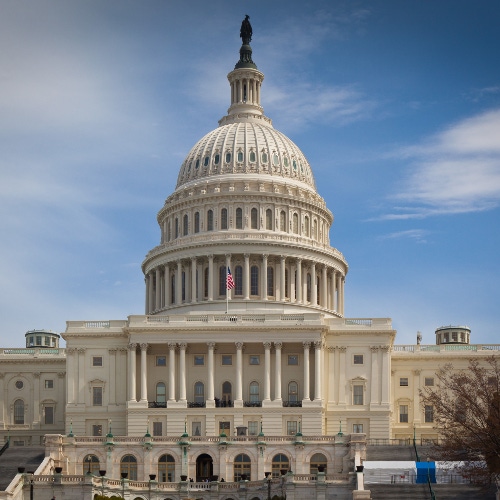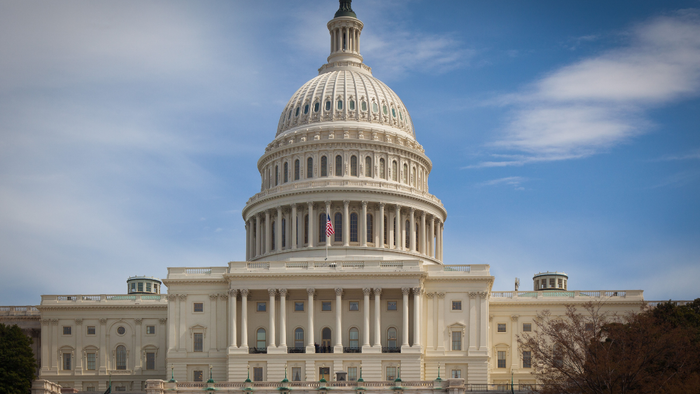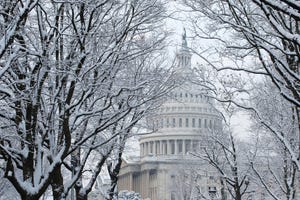House hearing considers 'breaking barriers' to broadband permitting
A House hearing on broadband permitting generated broad agreement that reforms are necessary as deployments ramp up, but less consensus on the way forward.

The House of Representatives held a hearing on Wednesday to consider legislation that would reform federal broadband permitting regulations, among other things.
The hearing, entitled "Breaking Barriers: Streamlining Permitting to Expedite Broadband Deployment," was helmed by House Energy and Commerce Committee Chair Cathy McMorris Rodgers (R-WA) and Communications and Technology Subcommittee Chair Bob Latta (R-OH).
It featured testimony from witnesses including Michael Romano, executive vice president, NTCA–The Rural Broadband Association; Michael Saperstein, senior vice president of government affairs and chief strategy officer, Wireless Infrastructure Association (WIA); Michael O'Rielly, president, MPORielly Consulting; Louis Finkel, SVP of government relations, National Rural Electric Cooperative Association (NRECA); and Ernesto Falcon, senior legislative counsel, Electronic Frontier Foundation (EFF).
Figure 1:  (Source: Inge Johnsson/Alamy Stock Photo)
(Source: Inge Johnsson/Alamy Stock Photo)
On deck for discussion throughout the three-hour hearing were 32 legislative drafts, each addressing some aspect of broadband permitting or other potential barriers to deployment. The various bills would implement shot clocks on state and local government reviews of permitting applications, ease restrictions on federal land deployments, remove environmental and historic preservation reviews, cap fees and more.
The hearing comes as the industry prepares to participate in the $42.5 billion Broadband Equity, Access and Deployment (BEAD) program, which will incentivize a rush of buildouts in unserved regions of the country over the next several years. Members of the committee and witnesses alike pointed to the coming surge of broadband projects as a reason for urgent permitting reforms.
"Unfortunately, the Infrastructure Investment and Jobs Act spent more money without the needed fixes to the burdensome permitting process," said Chair McMorris Rodgers in her opening remarks. "Without removing barriers to deployment, a record amount of taxpayer money will be wasted."
Highlighting some of those barriers in his opening remarks, NTCA's Michael Romano shared instances of delays and unanticipated costs amongst their membership.
"Examples include a provider who incurred $30,000 in engineering and environmental fees and delay of nearly a year to cross BLM land for one small part of a large fiber ring. A provider who was trying to upgrade a network to fiber in a previously disturbed right-of-way that took nine months to approve despite a categorical exclusion under NEPA, with the approval coming too late to start construction during the winter. A provider who faced delays of nearly two years for historical and consultation processes under the National Historic Preservation Act for projects that were primarily in previously disturbed rights-of-way. And a provider who faced delays and fees of $12,000 simply to bore 15 feet under a railroad crossing," said Romano.
Overall, there was broad agreement that there's room for improvement but less unanimity on the solutions.
One bill proposal that generated some disagreement was the Fair Access to Internet Ready Poles – or FAIR Poles – Act, which would revise the Communications Act of 1934 "to provide that the exception for certain persons from the definition of the term 'utility' for purposes of the requirements relating to pole attachments does not apply to such a person who receives certain Federal broadband assistance, and for other purposes." Essentially, it would open electric cooperatives' pole attachments up to FCC regulations.
That idea was panned by NRECA's Louis Finkel, who said its passage would "dissuade" electric co-ops from participating in federal broadband programs.
"Cooperatives are some of the most willing entities to bring broadband to those hardest to reach and most expensive communities, and adoption of the FAIR Poles Act would unfairly change the rules of the game after providers have already gone through the complicated and costly process of applying for federal funding," said Finkel.
Conversely, Michael O'Rielly, former FCC commissioner, said he was "outraged" with electric cooperatives for rejecting what he called a "moderate step."
"These organizations represent entities that have sought to enter the broadband marketplace and have full access to the provisions of 224 for areas outside their natural footprints but reject any type of reciprocity. These are the same entities that stood at my door at the FCC and begged to be put first in line on broadband subsidies, leaving others to pick for the leftover areas and funds," said O'Rielly. "Not only should this applicable bill be passed into law but the current exemption should be completely eliminated."
People and portals
Another witness, the EFF's Ernesto Falcon, noted that while certain permitting reforms are necessary – including standardizing fees in a "consistent and logical" way on public land – the ideal solution would be to bolster staffing and resources for reviewing permits.
"The challenge here that we're facing is this is the largest public works project happening in many areas for decades," he said in reference to BEAD. "And they don't have the staffing in place to handle that. So staffing up and providing the personnel resources to review these permits in an expeditious way resolves the issue."
Along those lines, others referenced the need to streamline the process through simple electronic portals that could give applicants better transparency into the permitting process.
"This is a simple but easy, really helpful fix that would at least allow applicants to know where they are in the process. Currently, there is no transparency into where they are with the federal aid. So that would be a very helpful fix," said WIA's Michael Saperstein on the subject of portals.
Speaking with Light Reading about permitting reform, Marissa Mitrovich, vice president of public policy at the Fiber Broadband Association (FBA), echoed the need for certain changes. She noted that FBA's members have cited delays of four to seven years in extreme cases to get permits approved.
"BEAD funding is going to be on a four-year timeline. So the time is now to certainly address these issues," she said. In terms of reforms, however, similar to Falcon, she pointed to the need for more staffing and digital processes. "FBA members will be thrilled if we could have all of the permitting applications in electronic format," she said.
Former FCC official Blair Levin, who was director of the National Broadband Plan under President Obama, told Light Reading that permit reform is an area where bipartisan solutions are "absolutely possible" but the discussion requires collaboration with state and local leaders, as well as investment in technology that can streamline the process.
"Whether you need legislation, I don't know the answer to that. But I'm 100% certain you need better tools to collect and analyze information," said Levin. "What I would like the federal government to do is hire someone to build the tools and then license them for free to every state and local government."
Related posts:
— Nicole Ferraro, editor, Light Reading, and host of "The Divide" on the Light Reading Podcast.
About the Author(s)
You May Also Like












